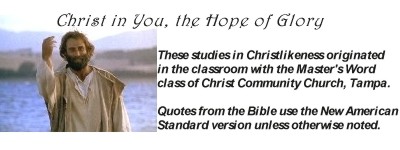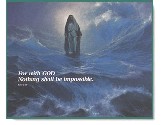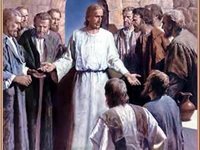Opening Thought
What a Character!

 We can usually pick up on who the “character” is in the group – a little louder, very outgoing, seems to feed on getting a laughing response. And there are other “characters” among us – maybe just a little unique in the way they approach life. Still, very noticeable in a group, just not as “noisy”. We’re actually all characters, exhibiting our own set of unique features. It’s just that most of us manage to do that while going through life more quietly.
We can usually pick up on who the “character” is in the group – a little louder, very outgoing, seems to feed on getting a laughing response. And there are other “characters” among us – maybe just a little unique in the way they approach life. Still, very noticeable in a group, just not as “noisy”. We’re actually all characters, exhibiting our own set of unique features. It’s just that most of us manage to do that while going through life more quietly.I wonder if people in Jesus’ day thought He was a “character”. Perhaps. He certainly stood out, didn’t seem to be swayed by the direction of the crowds, stood up and spoke up when He needed to – probably made quite a few people uncomfortable.
There’s another side to “character”, reminding us of the desirable qualities we look for in a person. The world works at defining those characteristerics according to their godless perspective – like the bumper sticker “Just be Nice”. As Christians, we know to find the benchmark of character in Christ. He is our model and measure as we seek to develop biblical, godly character.
Wouldn’t it be nice if every once in a while, someone would turn their head our way and think “What a Christlike character that person has!”
Study Notes:
The Character of Christlikeness
We've already looked some at the spiritual mindset that is essential to Christlikeness in sessions 16 & 17. When you look in the mirror, do you see yourself as a "spiritual man" (or woman)? Is that an essential feature of "who you are"?
In 2 Corinthians 2:6ff, Paul speaks of the amazing privilege we have because we are redeemed in Jesus Christ and indwelt by the Holy Spirit -- we possess the wisdom of God. Careful, we don't claim to be like God -- but He has opened to us fountain of His knowledge for us to live by in wisdom. Remarkable. And that "living in wisdom" is the essence of Christlikeness.
1. The Law of the Spirit of Life
v. 2 - sets free from the law of sin
v. 3 - anchored in what?
v. 4 - impacts our...
keep going!
2. Contrast with the World
- We certainly live in a world full of "characters". I sometimes comment "People can be such... people!" By design, we are unique, we have our own way of connecting with the world around us, and so many different ways of expression.
- As Christians we do face a challenge in balancing our "mind of Christ" and being part of the world. We all know the phrase "so heavenly minded that he's no earthly good". For starters, don' t forget that Christ is our model -- He was the essence of being heavenly minded. Yet He was also the definition of earthly good! But then, with Christ as our model, we do still need to express our godliness in our own special way.
 Paul describes this separation in 1 Corinthians 2:6-16. We have things revealed to us by the Holy Spirit that the world will never see. (To much extent, they don't want to see it!) This revealing is based entirely on the "revealed" truth referred to in 2:10. Based on 1 Peter 1:21, and other related scriptures, we understand "revealed truth" to be a finished work by God, contained in what we hold as the Bible. In other words, since the establishment of the Church and the completion of the Canon of Scripture, there is no new revelation from God. We have a completed revelation from God, all from that we need in order to know Him and obey Him.
Paul describes this separation in 1 Corinthians 2:6-16. We have things revealed to us by the Holy Spirit that the world will never see. (To much extent, they don't want to see it!) This revealing is based entirely on the "revealed" truth referred to in 2:10. Based on 1 Peter 1:21, and other related scriptures, we understand "revealed truth" to be a finished work by God, contained in what we hold as the Bible. In other words, since the establishment of the Church and the completion of the Canon of Scripture, there is no new revelation from God. We have a completed revelation from God, all from that we need in order to know Him and obey Him. - Our mission: 2 Cor. 2:15, "he who appraises all things", meaning that as Spirit-guided believers in Christ, we evaluate and respond to the various proddings and promptings of the world around us in godly manner, always anchored in Biblical truth. Ephesians 4:11-16 is a good passage about Christlikeness. Verse 14 describes the potential stormy influences of the world that we face anchored in Christ and His word (v.15).
- Our model: v. 16, the mind of Christ. See Romans 11:33-36, "Oh the depths of the wisdom and knowledge of God!" It is remarkable to realize that the Master of the Universe has enabled us to "think His thoughts", "have His mind". While we recognize our finite human limitations, we don't suggest being "like God" (Satan's sales pitch to Adam & Eve), yet we are empowered by the Holy Spirit to model the mind of Christ. Isaiah 55:8-9 says it well, "My (G0d's) thoughts are not your thoughts", He is infinitely loftier than we. Note: Isaiah 55 is a marvelous chapter for you to meditate on -- "Ho everyone that is thirsty...".
- Note that I did an earlier study on the Mind of Christ, focusing on Philippians 2:5 -- Sessions 15 & 16 (October-November).
- In Session 11, we introduced the theme of the Fruit of the Spirit as a portrait of Christ. In that session, we took time to think about specific events/actions in Christ's life that demonstrated each of the fruit. Let's spend some more time now looking at the Fruit in Christ's life. Also, let's be sure to note that this is a deep well -- please use these notes as stepping stones to lead you into deeper and deeper studies about the person of Christ.
- Remember that the same Holy Spirit Who empowered the Son of God to express His life with these godly characteristics dwells in you... you are the temple of the Holy Spirit, 1 Corinthians 6:19. His mission is to enable, empower, lead you through the process of living these manifestations of Christlikeness.

- It is suggested that this listing of the fruit of the Spirit lends itself to be broken into three sub-groups --
1. Love, Joy & Peace: our Godward relationship
2. Patience, Kindness & Goodness: our relationship to others
3. Faithfulness, Gentleness & Self-control: our internal character - Love --
1. Reflect on Mark 1:40-42, Jesus "moved with compassion" for those in distress through no sin of their own.
2. Then note Matthew 9:10-15, where Jesus loves those in sin, offeres them opportunity to repent.
3. Remember great expression of love in 1 Corinthians 13 which puts the "stake in the ground" for love being the cornerstone of godly character.
4. Think about the longsuffering love Jesus had for His disciples. For example, after the Resurrection, in John 21:15ff, Jesus talks with Peter about their love for each other. - Joy --
1. This isn't talking about silliness, giddiness, the shallow fun-loving mentality that seems so important to our society. This is deep, resilient satisfied happiness, not dependant on surroundings, based on what the heart knows to be true.
2. In Philippians 4:4-8, Paul reminds the believer to always have a rejoicing lifestyle, then goes on to develop how that lifestyle is developed and maintained.
3. Compare the parables Jesus taught in Luke 15, looking at the joy that is experienced by those involved when they found what was lost -- and remember these are portraits of God's own joy.
4. One of the best things about joy is sharing it. For example, in Luke 10:17ff, when the Disciples returned from their missionary outing.
5. One final thought: As we live Christlike lives, we are in the process of giving God joy, causing Him to have pleasure -- what an amzaing thought. In John 17:13, Jesus tells us that His joy is fulfilled in our success. Wow. - Peace --
1. What comes to mind when you think of "peace"? World events? Difficulties with people? Inner struggle? From God's perspective, these all come back to relationship with Him. Romans 5:1, peace with God is foundational to the believer's walk.
2. Once we have peace with God, we are able to walk with the peace of God in our life, Philippians 4:7. This is inner tranquility and stability anchored in Christ. All of the outside circustances are handed over to God.
3. Compare Jesus' peace -- sleeping in that boat, Matthew 8:23-27 ; hearing that Lazarus had died, John 11 ; enduring those "trials" before His Crucifixion, Luke 22 & 23. - Patience --
1. Are the people around you patient? The world is a "provoking" place -- people will always be... people!
2. Think of the patience Jesus had, waiting through 30 years of becoming an adult, followed by 3 years of tumultuous pressure.
3. There are two marvelous Greek words used in the New Testament for "patience". In Galatians 5:22, it is a word that emphasizes longsuffering and self-restraint, often related to expressing mercy to others.
4. In James 1:4, God tells us to "let endurance have its perfect result". That word "endurance" is another great Greek word meaning steadfastness, constancy, endurance, perseverance; picture taking a 100 pound weight and placing it on top of a bean. While a marble might squirt out from under the weight, the bean stays under the weight, enduring the pressure. This word encourages us not to be swerved from our deliberate purpose and loyalty to our faith in Christ and goal of Christlikeness, even by the greatest trials and sufferings. - Kindness --
1. Kindness & Goodness seem to work together in their development and expression. One without the other would be out of balance. Kindness shouldn't be indulgent; goodness shouldn't be harsh and self-righteous.
2. Kindness relates to the quality of who you are even though it is automatically an expression that impacts others. It is anchored in your moral goodness and integrity. - Goodness --
1. The other hand of Kindness. It is the expression of blessing that you place on others, the testimony that you are know by.
2. Where is this godly character coming from? The moral goodness and integrity of the "new man" that you are in Christ, what Paul refers to as "God's workmanship" to result in good works (Ephesians 2:10). - Faithfulness --
1. In the Old Testament, God often used a special Hebrew term, "hesed", to express the tenacious and compassionate love God has for His people. This term speaks of a deep-rooted loyalty. It is hinged on the high value of who or what is involved.
2. Hosea is perhaps one of the best illustrations of God's "hesed", longsuffering love for His people. He was tested more than once by a wandering, sinning wife, a picture of Israel's relationship to God.
3. We often falter in being faithful -- the world around us seems to be the opposite! (Take a look at 2 Timothy 3:1-5.) It might help to think about some of the words we have in English related to faithfulness -- loyal, constant, trustworthy, staunch, resolute. Perhaps we need to strengthen our ability to think in these terms as we face the war around us that seeks to break down our resolve.
4. Remember that allowing the Holy Spirit to lead your life will produce this fruit that is Christlikeness. And that includes faithfulness. - Gentleness --
1. This word emphasizes a "pre-disposed" spirit that intends to mild, soft to the touch in the it expresses to others. In this way, it leads to and partners with the final fruit of self-control.
2. Watch the way Jesus was with the people around Him. We know He was driven, passionate about His mission. Yet, in the presence of people, He was always gentle. He would softly and tenderly touch their lives, then He would move on with His mission. - Self-control --
1. I prefer the word Discipline. The word speaks of the virtue of one who masters his desires and passions. The word also points us to the related life pattern of being a Disciple.
2. If Love is the cornerstone of our Christlikeness, then Discipline can be seen as the process that enables this portrait to become ours.
2. Meekness is a related word -- some define this as "power under control".
3. Where does our power come from? As the Holy Spirit enables us, "we can do all things". Yet we bow humbly, recognizing our fallen nature, horrified by our capability to turn away, committed to "press on in order to lay hold" of our goal in Christ.
For further study...
1. How did people see the fruit of the Spirit in your life this past week?
2. Think through the list and identify the top 3 fruit, in order of priority, that you “really need to work on”.
3. Think back through Romans 8 – what are a couple of steps you can take to deepen your spiritual life?




































